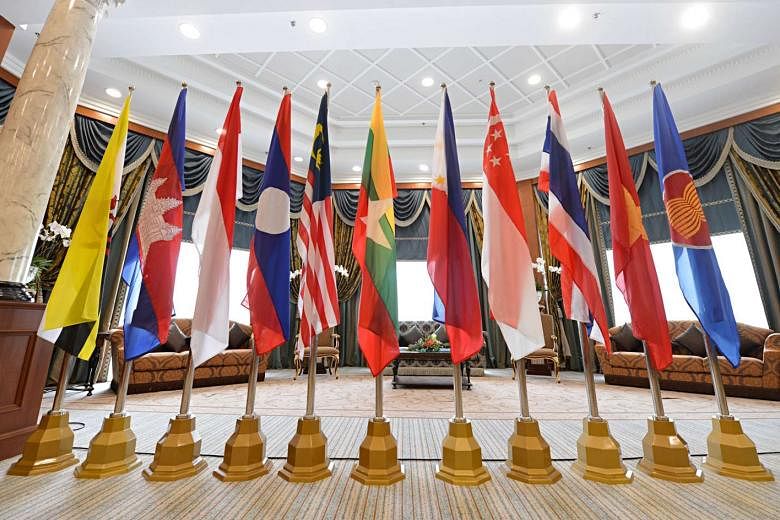South-east Asia has been attracting an increasing number of foreign direct investments. Most multinational corporations have included the emerging markets of Indonesia, Thailand, Malaysia, Philippines, Vietnam and Myanmar in their expansion plans.
Strong legal protection of intellectual property (IP) is one of the factors that attract foreign investment, especially in knowledge-intensive sectors. In the recently published 2015 International Intellectual Property or IP Index, how did Asean member states fare relative to other global players? Where can they improve so as to spur further investments into the region?
The IP Index, which is compiled by the Global Intellectual Property Centre, assessed the IP environment in 31 jurisdictions. It took into account patent, trademark and copyright protection, trade secrets, market access, enforcement rate and membership in international IP-related treaties.
In all, 31 countries were assessed and given scores out of 30. The 31 included six of the 10 Asean member states. Of the six, Singapore emerged tops, followed by Malaysia, Brunei, Indonesia, Vietnam and Thailand.
Singapore fared extremely well in the IP Index, at 25.38, due to the strict IP laws it has in place, adequate and effective enforcement of IP rights, including action against online piracy and prevention of copyright infringement through Web hosting, streaming and linking. It has also ratified some international treaties (Wipo Internet Treaties, Singapore Treaty on the Law of Trademarks) and entered into a free trade agreement (FTA) with the United States which includes substantial provisions on IP rights.
Malaysia scored an average 14.62 in the IP Index and has room for improvement. While Malaysia has increased its enforcement activities to curb online piracy and amended its copyright law to include penalties for unlawful Web hosting, streaming and linking, levels of piracy - both physical and online - are high. The IP Index score was also attributed to Malaysia's lack of entry into any FTAs with specific or substantive IP rights provisions. Malaysia is currently negotiating three FTAs, including one with the European Union (EU) and with the recently concluded Trans Pacific Partnership(TPP) talks, its performance in the IP Index may improve as there are substantial IP provisions in those agreements.
Indonesia, the darling of Asean countries, thanks to its large population, scored 8.61 out of 30 in the IP Index. What was in its favour was its new Copyright Act, which included a notification system that gives the government power to block infringing websites. Sadly, with software piracy levels through the roof (it was highest of all economies included in the IP Index), no stiff penalties for infringement and no FTA with substantial IP provisions, its overall score on the IP Index was low.
Vietnam, a country developing at a very quick pace, performed poorly in the IP Index (7.84), with the low scores partially attributed to its narrow interpretation of "invention" (with respect to patents). Its IP Office takes the term "invention" to include only products and processes, thereby rejecting inventions not related to either (for example, second medical use patents). That, together with the substantial delays in the patent prosecution process and lack of deterrents against copyright infringement, brought its scores down.
It does not help that Vietnam is not a contracting party to any of the treaties covered in the IP Index. Though with the TPP and with Vietnam negotiating an FTA with the EU, which has substantial IP provisions, the IP Index score may increase next year.
Thailand scored 7.1, the lowest score of the 31 countries in the index. Its commendable effort in improving border enforcement with the setting up of additional checkpoints at key border crossings, was noted. It also introduced a rudimentary notice and take-down mechanism against Internet service providers (ISPs) for online infringement activity. Unfortunately, the country still has weak protection for well-known marks, sky-high counterfeiting rates, and delayed enforcement procedures. Although Thailand, like Malaysia, also has FTAs with Australia, New Zealand and Japan (among others), these appeared not to bear any weight in the IP Index scores.
Analysing the method in which these six Asean countries were assessed and given scores is enlightening. The scoring system is debatable but that goes for all types of indexes. At least the IP Index provides a basic assessment and comparison tool for governments, companies and the public.
It is crucial that Asean countries understand the importance of ensuring adequate IP rights protection and creating an efficient IP ecosystem.
The effort has to stem from both government level (with stiff penalties incorporated into the laws against infringement) and the people (education of the masses on IP as a type property right).
Perhaps with such effort, and with many of these countries eventually negotiating and signing an FTA with the US or the EU, both of which will have substantial IP provisions, South-east Asian countries will progress in the right direction. It is only a matter of time.
If Asean countries are able to improve their IP ecosystems, diversify their customer base, ensure production cost is kept reasonable, and combine those with stable governments and political systems and boosts to skilled manpower, they will be able to attract even more foreign direct investments and thus enjoy greater economic growth.
•The writer is director of the Trademarks and Designs Division at intellectual property firm KASS International.
•S.E.A. View is a weekly column on South-east Asian affairs

